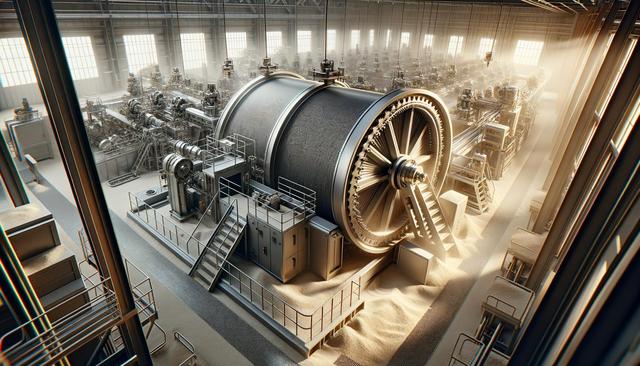Understanding Rotary Drum Screens and Their Applications
Rotary drum screens are mechanical filtration devices used to separate solids from liquids in various industrial processes. These systems are especially vital in wastewater treatment facilities, where they help remove debris and solid waste before further processing. In the food industry, rotary drum screens are used to filter out solid particles during food production, ensuring product consistency and hygiene. Similarly, chemical manufacturers use these screens to separate solids from chemical mixtures, improving the efficiency and safety of production lines.
One of the defining characteristics of rotary drum screens is their rotating cylindrical design, which allows for continuous operation and minimal maintenance. The drum is typically made from stainless steel or other corrosion-resistant materials, ensuring durability in harsh environments. These systems come in different configurations, such as externally-fed or internally-fed designs, depending on the specific requirements of the application.
Typical applications include:
- Pre-treatment of municipal and industrial wastewater
- Processing of fruits, vegetables, and meat in food facilities
- Separation and recovery of chemicals in manufacturing plants
Choosing the right rotary drum screen often depends on factors such as flow rate, solid load, and the nature of the material being processed. Manufacturers offer a range of models with varying screen sizes, materials, and flow capacities to accommodate these needs.
Key Considerations When Choosing a Manufacturer
When evaluating rotary drum screen manufacturers, several important factors come into play. First and foremost is the quality of materials used in construction. Given the demanding environments in which these systems operate, durability is crucial. Many manufacturers offer models built with stainless steel or specially coated metals to resist corrosion and wear.
Another essential factor is customization. Many operations have specific requirements that standard models may not meet. Look for manufacturers that provide tailored solutions, including custom drum sizes, screen mesh options, and installation configurations. Technical support and after-sales service are also vital, especially for facilities that rely on minimal downtime.
Here are some features to look for in a reputable rotary drum screen manufacturer:
- Proven track record in your industry sector
- Availability of technical documentation and certifications
- Responsive customer service and technical support
- In-house engineering and design capabilities
Pricing is another consideration, but it should not come at the expense of quality or long-term performance. A slightly higher upfront cost can often result in lower maintenance expenses and longer operational life.
Top Rotary Drum Screen Manufacturers to Consider
Several rotary drum screen manufacturers are known for delivering reliable and efficient filtration solutions across various industries. These companies offer a broad selection of equipment to meet the diverse needs of wastewater treatment plants, food processors, and chemical manufacturers. While brand names are not mentioned here, you can identify top manufacturers by their reputation for innovation, engineering expertise, and customer satisfaction.
Manufacturers with a global presence often provide the advantage of localized support and quicker response times. They typically maintain regional service centers and a network of authorized dealers to assist with installation, maintenance, and spare parts. Additionally, many of these companies invest in research and development to create more efficient and environmentally friendly technologies.
What distinguishes top-rated rotary drum screen manufacturers?
- Wide range of product offerings
- Strong focus on sustainability and energy efficiency
- Ability to handle high volumes of solids
- Comprehensive warranties and service agreements
It’s also helpful to review customer testimonials, industry awards, and case studies when evaluating potential suppliers. These resources can offer insight into how well a manufacturer meets the needs of similar operations.
Technological Advancements in Rotary Drum Screens
As industries evolve, so do the technologies behind rotary drum screens. Modern systems incorporate advanced automation features that streamline operations and improve performance. For example, some units now include programmable logic controllers (PLCs) that allow operators to monitor performance metrics and adjust settings remotely. This level of automation reduces the need for manual oversight and enhances operational efficiency.
Screening technology has also improved, with manufacturers offering finer mesh options and more effective solids removal. These advancements are particularly beneficial in industries where even small particles can disrupt downstream processes or compromise product quality. Some systems are equipped with self-cleaning mechanisms that reduce maintenance and extend the lifespan of the components.
Notable innovations include:
- Energy-efficient motors and drive systems
- Integrated control systems with user-friendly interfaces
- Enhanced sealing to prevent leakage
- Modular designs for easy expansion or upgrades
Investing in cutting-edge rotary drum screen technology can provide significant long-term benefits. Manufacturers that stay ahead of industry trends and offer forward-compatible solutions are often better positioned to support your operational growth.
Environmental and Operational Benefits
Rotary drum screens play a crucial role in promoting environmental sustainability and operational efficiency. By effectively separating solids from liquids, these systems help reduce the environmental impact of industrial processes. In wastewater treatment, they prevent solid waste from entering natural water bodies, supporting regulatory compliance and environmental protection goals.
In food and chemical manufacturing, rotary drum screens minimize product loss and improve resource utilization. They contribute to cleaner production lines, which can enhance food safety and reduce contamination risks. Additionally, many systems are designed to minimize energy consumption and water usage, aligning with broader sustainability initiatives.
Key environmental and efficiency benefits include:
- Reduced waste disposal costs
- Improved water reclamation and reuse
- Lower energy and maintenance requirements
- Enhanced process reliability and consistency
Choosing a well-designed rotary drum screen not only supports your operational goals but also contributes to a more sustainable industrial ecosystem. Manufacturers who prioritize eco-conscious design and efficient performance offer added value for businesses aiming to improve their environmental footprint.
Conclusion: Making the Right Choice for Your Filtration Needs
For businesses in wastewater, food, and chemical industries, selecting the right rotary drum screen manufacturer is a critical decision that impacts both efficiency and compliance. By focusing on quality, customization, support, and innovation, you can identify manufacturers that align with your operational goals and industry standards. Whether you’re upgrading an existing system or investing in a new installation, taking the time to evaluate your options will ensure a more reliable and sustainable filtration solution.
Ultimately, the right manufacturer will offer not just a product, but a partnership—helping you navigate challenges, meet regulatory requirements, and optimize your processes for long-term success.




Leave a Reply